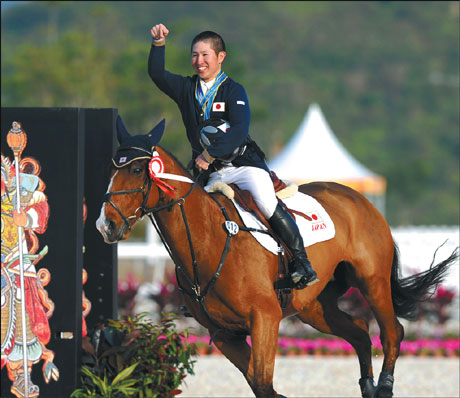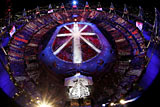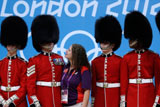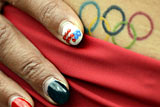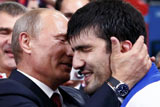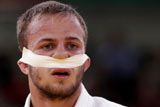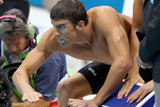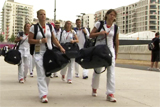
Zen and the art of making a horse jump over things
Updated: 2012-07-23 08:02:41
By Agence France-Presse (China Daily)
|
|||||||||||
|
Kenki Sato of Japan makes a lap with Toy Boy and the two gold medals he won in individual and team jumping at the 16th Asian Games on in 2010. Sato is a Buddhist monk who took leave from the Myoshoji temple near Nagano as he attempts to win an Olympic medal in London. Nicolas Asfouri / Agence France-Presse |
He'd prefer enlightenment to a medal, but when Japan's horse-riding Buddhist monk Kenki Sato saddles up for London 2012, he'll be representing one of the Olympics' more unusual families.
Shaven-headed Sato, who starts each day with a morning prayer, is following his younger brother Eiken, who also trained as a priest and rode at the Beijing Games. His sister, Tae, 24, is a five-time national show-jumping champion.
And his father, Shodo, who heads a 460-year-old temple and adjacent horse-riding club, was a member of Japan's equestrian team before the 1980 Games in Moscow - only to have his Olympic dream dashed when Japan boycotted.
Kenki Sato is on extended leave from the Myoshoji temple in mountains near Nagano, where his father is the 25th master, to train for London where he will compete in eventing, which combines dressage, cross-country and show-jumping.
Among his teammates is Hiroshi Hoketsu, 71, the oldest competitor in any sport at Beijing 2008, who is entered in the separate dressage category.
They are not strongly favored to end Japan's 80-year wait for a second equestrian medal, following Baron Takeichi Nishi's show-jumping gold of 1932. But Sato said the experience would have spiritual value.
"I may learn something as a human being when I encounter various people with different religions and languages abroad," said Sato, who turned 28 earlier this month. "I want to feed it back into my path to Buddhist enlightenment."
Four years ago, while his brother competed at the last Olympics, Sato was serving a year's apprenticeship for the priesthood, secluded in a prestigious Zen temple.
"My old master secretly showed me a newspaper clipping about my younger brother. I was so happy I shed tears," he said.
"Somewhere in my mind, I didn't want to be outdone by my brother. This turned into enormous energy for me to continue as a sportsman."
In 2010, Sato claimed team and individual eventing golds at the Asian Games and finished 35th at the world championships.
His journey to London began at the age of seven, when he started training for competition under his father.
"I think it was largely because my father could not become an Olympian," he said.
Shodo Sato, 61, paired the disparate worlds of Buddhism and equestrianism after growing up around horses in the mountains of Nagano, where they were still the main mode of transport when he was a child.
He practised horsemanship while attending a Buddhist university in Tokyo and opened an equestrian park next to the temple in 1979. The facility's clubhouse overlooks the riding ground from a hillside dotted with tombstones.
When his children were young, he would carry them around on horseback. Asked about his disappointment of 1980, when Japan joined a boycott over the Soviet invasion of Afghanistan, the elder Sato is philosophical.
"I don't dwell on the past," he says softly. "It was all due to the circumstances of the times."
His son, who stands 163cm tall, has been training with reigning world and European eventing champion Michael Jung at a stable near Stuttgart.
But a vital part of his preparation is meditation, especially at home before competition. "When I cross my legs, it somewhat calms me and makes me feel like going all over again," he said.
However, Sato does not rely on the power of prayer alone.
"In principle, my sect doesn't recommend reliance on others," he said. "But for a moment when the competition is over, I think it is very important to give thanks to my horse, groom and family."
(China Daily 07/23/2012 page24)
Medal Count |
||||
| 1 | 46 | 29 | 29 | |
| 2 | 38 | 27 | 22 | |
| 3 | 29 | 17 | 19 | |
| 4 | 24 | 25 | 33 | |
| 5 | 13 | 8 | 7 | |
| 6 | 11 | 19 | 14 | |
